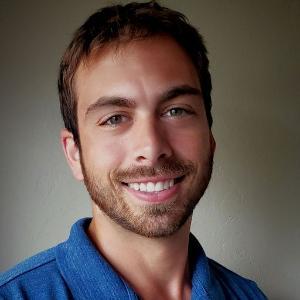 HHP - Update me in site_config > General Configuration
HHP - Update me in site_config > General Configuration
Applied Physiology & Kinesiology Ph.D. Student

Meet Grant Tays: A former Marine and current Ph.D. student in Applied Physiology & Kinesiology
Tays studies the effects of spaceflight on the human brain and sensorimotor performance. His dissertation focuses on individual predictors of adaptation and novel countermeasures to target sensorimotor performance deficits post-flight, either when returning to Earth or landing on the moon/Mars. Tays is a member of the Society for the Neural Control of Movement, the Society for Neuroscience, the Aerospace Medical Association and is a NIH T32 Trainee in the NINDS funded Pre-Doctoral Training Program in Movement Disorders and Neurorestoration.
Thank you to Grant Tays and all who have served.
I wanted to contribute to something that I believed was more important than my own personal self. I knew there were opportunities to participate in things that were beyond the scope of what I felt like I could accomplish by myself.
Definitely, my family has had members in the service for as long as the U.S. has been a country. Prominently, my grandfathers both fought in World War II, one of them fought in the Korean War and multiple of my uncles served in Vietnam and the Cold War.
My family has never had an expectation that we join the service, nor was it something that was particularly discussed prior to my enlisting. However, knowing that they had, encouraged me too. Not only for the direct effects, but by seeing the opportunities they were able to pursue because of their enlistment.
The College of Health & Human Performance has been massively important to me. It’s a premiere research department at a top public research university, the access to resources and faculty that are experts on a wide variety of topics has given me experience in topics that I never thought I would be able to research avidly. While much of my work is focused around NASA, there is generalization of my work to the military, and in particular, the health of current active duty military members.
I hope to work for the U.S. government as a civil servant and conduct research on these topics and similar ones, investigating sensorimotor performance in differing environments. I hope to include more translational work, taking my research from the lab to the environment that people are working in.
I was initially interested in providing personalized rehabilitation techniques to amputated veterans. This research exposed me to the field of spaceflight human research. At the current time, there are few effective sensorimotor and central nervous system interventions to assist astronauts. On Earth, there are large teams that collect astronauts after landing, but in the case of emergencies, and when landing on different planetary surfaces, there is less aid available to them and what might be simple problems become very dangerous.
The military gave me a broader perspective on everything. While education and research can be stressful, it’s important to keep the bigger picture in mind and move towards those goals. Education is a step to help you get there, it’s a beneficial thing. Keeping yourself grounded mentally is important to handle that stress and accomplish your goals, both personal and professional.
I think one of the most challenging parts is often working independently in education, particularly coming from a team based environment of the military. This can be challenging both ways, learning how to rely on others to do their component of work, but also knowing that certain projects are solely yours and the responsibility for it rests at your feet.
One of the best parts of pursuing higher education is getting to work on the forefront of research problems. You get exposure and experience investigating problems that we don’t know the answer to, and you get to personally contribute to that.
I’ve learned so much about so many topics that it is hard to narrow that down. Overall, I think that it’s putting yourself and your ideas out there. There’s enough room for everyone on the team, and we also need everyone on the team. The problems we are trying to solve are complicated and multidisciplinary in nature; everyone has valuable input. That includes you, too.
I think one of the best pieces of advice I have for veterans is to leverage your current skills. That can be directly related to what you did in the military, if it was a technical skill, but it can also include skills like leadership and time management. The military provides a large skill set that many people may not have, like the ability to adapt quickly, and being a team player and leader, which helps formulate effective communication skills. Those are things that can help you succeed in advanced degree programs.
--
Comment / Like / Share - Connect with #UFHHP
FACEBOOK │ INSTAGRAM │ LINKEDIN │ TWITTER
--